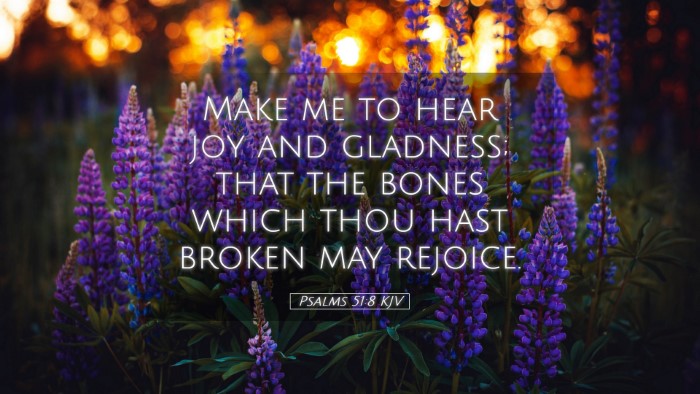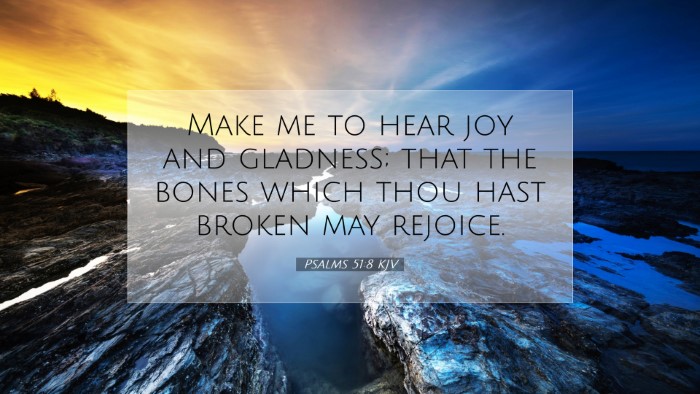Psalms 51:8 Commentary
Bible Verse: "Make me to hear joy and gladness; that the bones which thou hast broken may rejoice." (Psalm 51:8)
This verse is a profound appeal from King David, expressing his deep remorse and yearning for spiritual renewal following his sin with Bathsheba. The context of this psalm is significant, as it was composed after Nathan the prophet confronted David about his grievous actions. The commentary below synthesizes insights from respected public domain commentaries to provide a comprehensive understanding of this verse.
Overview of Psalm 51
Psalm 51 is often regarded as a penitential psalm, attributed to David's sincere plea for mercy following his moral failure. The entire psalm is an exploration of repentance, divine grace, and the restoration of fellowship with God. David’s cry in verse 8 encapsulates the pain of his shattered spirit and the hope for renewal.
Verse Analysis: "Make me to hear joy and gladness"
In this phrase, David longs for a restoration of joy that had been lost due to sin. Matthew Henry emphasizes that joy and gladness are fruits of divine forgiveness. He notes that true joy arises from a right relationship with God, which sin disrupts. David's request illustrates his awareness of this disruption and his desire to reclaim that joy.
The Significance of Joy in Repentance
The call for joy is critical in the life of a believer. Albert Barnes comments on the interplay between sorrow for sin and the joy of forgiveness. He notes that David seeks not only forgiveness but also the restoration of inward peace and happiness that comes from a reconciled relationship with God.
The Role of the Spirit in Restoration
Adam Clarke points out that the Holy Spirit plays a vital role in delivering this joy. Clarke suggests that the presence of the Holy Spirit is essential for the believer’s restoration, connecting it to David's plea for the Spirit to be renewed within him, as seen in earlier verses of the psalm.
The Bones Which Thou Hast Broken
This evocative imagery reflects the weight of sin upon David's soul. The "broken bones" symbolize a state of deep anguish and suffering caused by guilt. Matthew Henry interprets this as an expression of how sin has a debilitating effect on a person's spirit, leading to a sense of desolation.
The Nature of Divine Judgment
Clarke elaborates on the metaphor of broken bones, relating it to the chastening hand of God. While God’s discipline can be painful, it serves as a means to turn the heart back to Him. David recognizes his need for restoration, acknowledging that only God can mend his spirit and return his joy.
The Pathway to Rejoicing
David’s plea reflects a desire for restoration not just of joy, but of the ability to rejoice in the salvation that God provides. As both Barnes and Henry highlight, true rejoicing can only occur when we are in right standing with God, emphasizing the transformative power of repentance.
The Assurance of God’s Mercy
This verse also holds a promise. It assures believers that despite the weight of their sin, God’s mercy can heal. Albert Barnes remarks that God's readiness to forgive leads to the restoration of joy, compelling believers to turn back to Him even after moral failures.
Theological Implications
The theological implications of Psalm 51:8 are significant for understanding the nature of sin, repentance, and grace. The anguish of David serves as a reminder of the seriousness of sin and its consequences, while also illustrating the profound grace of God available to the repentant heart.
Furthermore, Matthew Henry expounds on the importance of lamentation and sorrow unto repentance. True grief for sin, he argues, leads to a longing for the joy that comes from reconciliation with God.
Conclusion
Psalms 51:8 encapsulates the heart of one who is acutely aware of his sins and the resulting separation from joy and gladness that comes from a close relationship with God. The insights from historical commentaries illuminate the pathways of repentance, the role of the Holy Spirit, and the assurance of God's grace. For pastors, students, and theologians, this verse exemplifies the journey from sorrow to joy, reminding us that restoration is always possible through true contrition and a heartfelt plea for divine mercy.
Key Takeaways:
- True joy is linked to a reconciled relationship with God.
- Sin has a debilitating effect on the spirit, akin to brokenness.
- The Holy Spirit is central to the restoration process following sin.
- God’s mercy is transformative, leading to renewed joy for the repentant heart.


